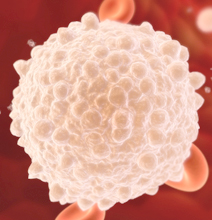Proteomics
Cancer proteomics
The proteome is the collection of all proteins (the functional molecules that coordinate cellular activity) produced in an organism.
Cancer proteomics is the study of the proteome in cancer samples
The last few decades have seen a remarkable development in techniques used for proteomics. These have allowed researchers to compare the proteins in cancer and normal cells, identify those unique to the former and use them to classify or characterize patients. As a result, several important biomarkers are now known, and more are expected to emerge.
Biomarkers are molecules found in blood, other human fluids or in biopsies that can be used to predict a patient’s response – e.g., resistance - to a particular drug. Their discovery paved the way for the development of personalized therapies.
Techniques from proteomics, often together with genetic analysis, are being used to improve our molecular understanding of cancer, and help the development of new therapies and diagnostic techniques for cancer.




